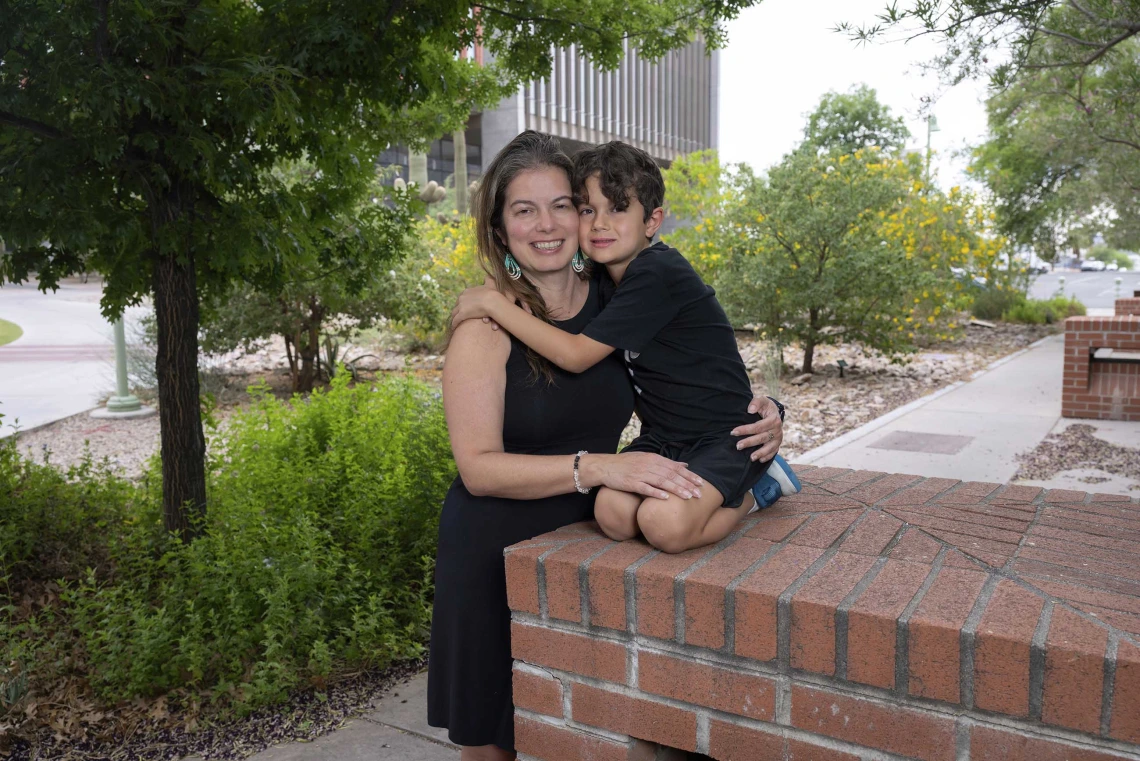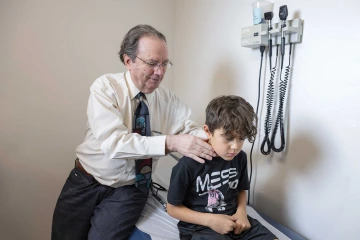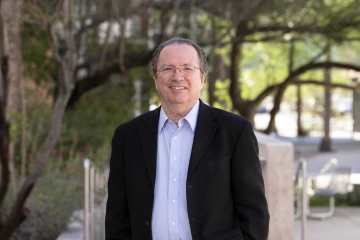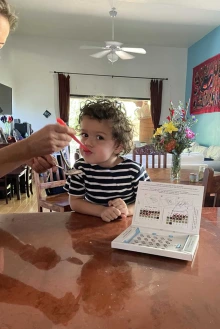Scientists on a quest to prevent asthma by boosting immune system
A family history of respiratory illnesses led environmental researcher Paloma Beamer, PhD, to enroll her newborn son in a clinical trial to prevent asthma.

Paloma Beamer, PhD, enrolled her youngest son, Javier, in a clinical trial studying Broncho-Vaxom® as a potential preventative treatment for asthma.
Photo by Noelle Haro-Gomez, U of A Health Sciences Office of Communications
Top takeaways:
- University of Arizona Health Sciences researchers are testing Broncho-Vaxom® in children to see if it can stop asthma before symptoms ever appear.
- U of A researchers say reduced exposure to bacteria may prevent the immune system from developing properly, which can increase the risk of asthma in children.
In her Tucson home, Paloma Beamer, PhD, sat next to her six-month-old son, Javier, with a container of yogurt in hand. She stirred in a powder – either a shield against asthma or a placebo – and wondered if it was the secret to overcoming a disease that has burdened her family for decades.

Fernando Martinez, MD, examines Javier Beamer at the U of A Health Sciences Asthma and Airway Disease Research Center.
Photo by Noelle Haro-Gomez, U of A Health Sciences Office of Communications
Asthma has defined much of Beamer’s life. Her father had severe asthma, and her brother had toddler-onset asthma. Though Beamer was not formally diagnosed with asthma until she was in graduate school, she used inhalers during severe colds, a pattern that continued through her teenage years and into college.
Javier’s family history placed him at high risk for asthma. That reality compelled Beamer, a mother, professor and associate dean in the U of A Mel and Enid Zuckerman College of Public Health, to enroll him in the Oral Bacterial Extract, or ORBEX, study. The study, conducted through the University of Arizona Health Sciences Asthma and Airway Disease Research Center, seeks to transform asthma care by preventing it.
Researchers are investigating whether Broncho-Vaxom®, a medication commonly prescribed in Europe and Latin America, can prevent asthma in at-risk children like Javier.
“This is an extremely high-reward situation,” said Fernando Martinez, MD, director of the U of A Health Sciences Asthma and Airway Disease Research Center and a professor of pediatrics in the U of A College of Medicine – Tucson. “If it’s effective, it would be the first prevention medicine, which would be extraordinary.”
Unintended consequence of cleanliness
Asthma occurs when lungs overreact to triggers such as viruses, pollen or exercise. Excess mucus is produced and airway muscles tighten, making breathing more difficult. While the exact causes remain unknown and no cure exists, symptoms can be managed by avoiding triggers and using medical care.
In young children, a cold can quickly escalate breathing issues, alarming parents and sending kids to the emergency room.

Fueled by memories of his mother’s asthma attacks, Martinez has been working toward a cure for asthma for over three decades.
Photo by Noelle Haro-Gomez, U of A Health Sciences Office of Communications
“Asthma is a disease of a wrong response to the environment,” Martinez said. “Kids get a cold, and then suddenly they start struggling to breathe, needing emergency care. Their lungs are almost constantly inflamed, reacting wrongly to stimuli.”
Martinez has devoted decades to understanding this chronic lung condition. He says treatments have advanced significantly over the years, but treatments only manage asthma, not prevent it, leaving a critical gap.
“We went from very ineffective treatments that condemned patients to a life of misery to now having new inhaled treatments, new injectable treatments, that help the great majority of patients,” Martinez said. “We have good medicines to treat it, but we don’t have medicines to prevent it without having to take medicines every day.”
A century ago, asthma was rare in children. Now, according to the Centers for Disease Control and Prevention, it impacts 4.6 million children under 18 in the United States.
The exact reason asthma is becoming more common is unknown; however, the hygiene hypothesis offers insight. It suggests reduced exposure to germs keeps a child’s immune system from developing the ability to naturally fight infectious organisms. Martinez links this to asthma’s increase, noting that reduced bacterial exposure may cause immune systems to misjudge harmless triggers, thus raising risk.
“Protecting our children is very important, but the price we have paid for that is that now we’re not well prepared to recognize that there are infections that are important and infections that are not important,” Martinez said.
“The immune system needs to be exposed to the environment and to an abundant number of bacteria to develop in an appropriate way.”
Pioneering asthma prevention
The ORBEX study aims to tackle this immunological tug-of-war by evaluating Broncho-Vaxom®, which is used worldwide but is not approved by the U.S. Food and Drug Administration. The oral medication, made from parts of common bacteria that cause respiratory infections, is believed to act as an immunostimulant, boosting the body’s natural immunity to prevent and treat bronchitis and rhinosinusitis.

Javier’s final dose of ORBEX treatment was in June 2023. Later this year, Beamer will find out whether he received the medication or a placebo.
Photo courtesy of Paloma Beamer
In the U.S., Martinez saw a bold opportunity; What if this medication could prevent asthma?
“In animal models and human studies, it showed promise in preventing respiratory issues, acting as a stand-in for the natural bacterial exposures modern children often miss,” Martinez said. “I developed the idea that this could become a preventive strategy for asthma while we wait to figure out which these specific bacteria are.”
Martinez, along with collaborators at 10 other sites, launched the ORBEX study seeking to mimic early bacterial exposure to guide immune systems, drawing on ideas such as the hygiene hypothesis. The study enrolled 800 infants, aged 6 to 18 months, who had a parent or sibling with asthma or they themselves had eczema.
Families including Beamer’s embraced a rigorous process through their participation in the study. They gave their children a powder for 10 days each month for two years, then monitored for wheezing or signs of asthma for three more years. Weekly text messages checked symptoms, monthly surveys collected data, and clinic visits tracked overall progress and well-being.
The COVID-19 pandemic disrupted children’s routines, though, and the closing of schools, daycares and extracurricular activities significantly reduced their exposure to common viruses. Homebound kids faced fewer viral triggers, and the resulting drop in illnesses meant fewer asthma-related symptoms emerged, prompting researchers to extend the study two more years to capture sufficient data.
Now, ORBEX is approaching a defining moment. At the end of this calendar year, the study will end and researchers will know whether Javier – and hundreds of other children in the study – received Broncho-Vaxom® or a placebo.
“Javier is one of the healthiest kids we know,” Beamer said. “If it turns out he had the medicine, I think it really does seem to have made a big difference.”
Martinez and the research team hope to present the findings at the 2026 American Academy of Asthma, Allergy and Immunology Conference.
“We have been working on this for a long time,” Martinez said, “so I’m very excited to see what comes next.”
Listen to Fernando Martinez, MD, talk about the need for ORBEX
Experts
Fernando Martinez, MD
Director, Asthma and Airway Disease Research Center, U of A Health Sciences
Regents Professor and Swift-McNear Professor of Pediatrics, Department of Pediatrics, College of Medicine – Tucson
Member, BIO5 Institute
Paloma Beamer, PhD
Professor and Interim Associate Dean, Department of Community Engagement and Professor, Mel and Enid Zuckerman College of Public Health
Professor, Department of Chemical and Environmental Engineering, College of Science
Member, BIO5 Institute
Contact
Blair Willis
U of A Health Sciences Office of Communications
520-419-2979, bmw23@arizona.edu

